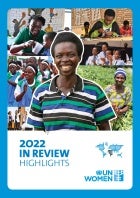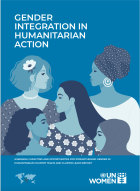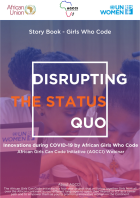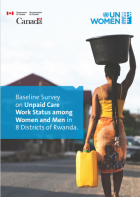1 - 7 of 7 Results
Date:
The 2022 in review yearly edition aims at keeping our esteemed readers abreast with the endeavors of the UN Women Rwanda programmatic highlights and achievements throughout the year. It encompasses the period of January through December 2022. Within these pages, we have meticulously curated a selection of activities undertaken by our organization, as well as providing a platform for the voices of those whom we have had the privilege of serving, to be heard. We trust that the contents of this newsletter will prove to be both enlightening and informative. Enjoy the read!
Date:
The assessment focused on HCTs and Cluster Working Groups (CWGs) in recognition of the central role they play in planning and coordinating humanitarian responses. Survey findings showed that the overall knowledge of Gender integration in Humanitarian Action (GiHA) was average, with just over half of the HCTs and Clusters
reporting a working knowledge and only one third (33 percent HCTs and 25 percent clusters) reporting comprehensive knowledge.
Date:
Innovations during COVID-19 by African Girls Who Code
Date:
The baseline survey on unpaid care work status among women and men in eight districts of Rwanda seeks to understand the care-related dynamics in households, this study utilized both quantitative and qualitative research methodologies. Drawing on Oxfam’s Household Care Survey (HCS) and the Harvard Analytical Framework (also referred to as the Gender Roles Framework). The survey helps to understand how women, men and children spend their time, how care activities are distributed in the household and the access that households have to basic public services and infrastructure that facilitate their everyday survival. The study also explored the social norms that shape power relations and gender division of care labor.
Date:
UN Women amplified women’s role in the COVID-19 response highlighting the significant leadership roles women played in leading the response efforts in materials on COVID-19 prevention disseminated in local languages and hand washing facilities were constructed in 6 elementary schools. 528 returnee migrant women workers from the Middle East and domestic workers across Addis Ababa have been provided with basic sanitation and hygiene training and raising awareness on the disproportionate impact of COVID-19 on women, girls, and vulnerable and marginalized groups.
Date:
The review indicated that Ethiopia has not only ratified many of the conventions and treaties related to refugees and asylum seekers, but also formalized these laws into its Constitution and in the national Refugee Proclamation. However, a closer analysis of the health sector focusing on sexual, reproductive, maternal, newborn, child and adolescent health (SRMNCAH) services to women and girls in the humanitarian settings, the laws, policies, strategies, guidelines, programs, and plans of the sector indicated a clear gap.
Date:
The highlights of this issue : Summary of Critical Interventions Needed: An Agenda For Action for Governments and Partners - Inspiring Agricultural Change: Sharefair on Rural Women's Technologies - Transforming Into a Green Sustainable Village With the Help of Women's Technologies - Remove the Time Burdens of Women Farmers for a More Productive, Improved Lifestyle - Both Women and Men to be Considered in Scaling up the Use of Agricultural Innovations - Close the National Policy Gap First to Narrow the Gender Technology Gap - Food and Nutrition Security Sarts With Agricultural production for Women - She Who Learns, Teaches: Using Social Networks for Technology Adoption - What Do We Still Need to Learn About Technology Adoption by Women Family Farmers, as Highlighted in the ESA Sharefair?







